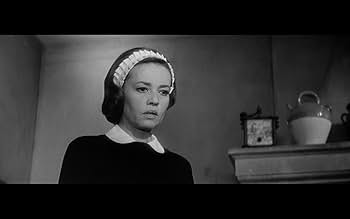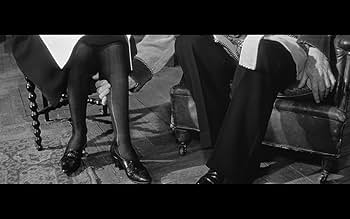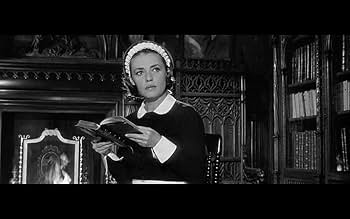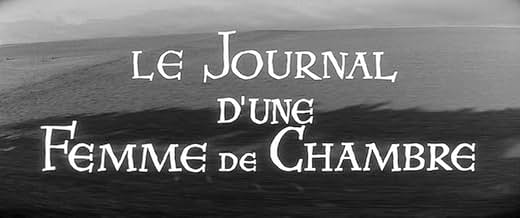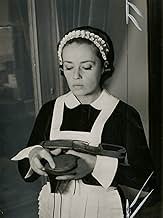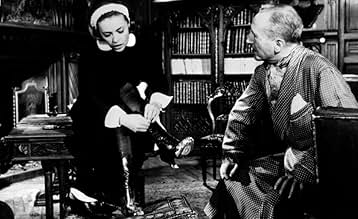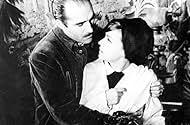IMDb रेटिंग
7.4/10
10 हज़ार
आपकी रेटिंग
अपनी भाषा में प्लॉट जोड़ेंA sophisticated and self-assured woman from Paris joins a middle-class rural estate as a maid and causes quite a stir among the variously uptight, perverse and violent inhabitants.A sophisticated and self-assured woman from Paris joins a middle-class rural estate as a maid and causes quite a stir among the variously uptight, perverse and violent inhabitants.A sophisticated and self-assured woman from Paris joins a middle-class rural estate as a maid and causes quite a stir among the variously uptight, perverse and violent inhabitants.
- निर्देशक
- लेखक
- स्टार
- पुरस्कार
- 1 जीत और कुल 2 नामांकन
फ़ीचर्ड समीक्षाएं
Bunuel's 'Diary Of A Chambermaid' was released in between two of his surreal masterpieces 'The Exterminating Angel' and 'Simon Of The Desert'. It is, on the surface at least, a lot more conventional as either of those, maybe that's why it doesn't get as much attention as it deserves. I don't know why it is rarely mentioned when people discuss the very best of Bunuel, but for me it's almost as great as 'Viridiana' and 'Belle De Jour'. The story was previously filmed by Renoir in the 1940s, but I haven't seen that version, so I can't say how different Bunuel's approach to the material is. As Bunuel claimed not to have seen it either I don't feel so bad. Jean Moreau, the beautiful star of Truffaut's 'Jules And Jim' and countless other Euro art film favourites, gives a brilliant performance as the enigmatic Celestine, maid to The Monteils, a very odd family living in pre-War France. Bunuel includes some of his usual comments about sexual deviance, and France's future under the Nazi occupation haunts the whole film, but what is most interesting to me about the picture is its subtlety and ambiguity. Like 'Belle De Jour' I think each repeated viewing will reveal more, and opinions on its meaning will depend on the individual viewer. Personally I'm still exploring Bunuel's extraordinary body of work. It is exciting doing so. I've probably only seen a third of his output so far, but I've yet to see a movie made by him that is less than fascinating. 'Diary Of A Chambermaid' just might be his most underrated film. I highly recommend it.
The best thing about Bunuel is his ruthless lucidity, and it's thoroughly on display here. All his films start from the conviction that no one is to be pitied - or even if they are, Bunuel, like life, will not oblige, and neither the audience nor the person concerned should expect it of them. Which is not to say that all abuses are right - the film postulates that between fascist and violent criminal there is little difference, and then, true to lucid form, makes it clear at the end that evil does *not* automatically bring about its own destruction; a fact not to be lamented but fought over. Bunuel said he thought it was his most erotic film. It's not an unreasonable claim. There's not a single sex scene. Go figure.
Luis Buñuel, the man considered Spain's finest filmmaker and revered master of surrealism by both critics and film historians, made a surprising change of style in the first of the series of masterpiece she did in France during his last years. Taking out his usual surrealist set-pieces, he adapts Octave Mirbeau's revered novel about social classes in a very straight-forward fashion. However, this does not mean the movie is bad as many may believe; quite the opposite, "Le Journal d'eune Femme de Chambre" is a perfect showcase of Buñuel's finest film-making style, ambiguous and stylish, like the master's own vision of life.
The plot follows Celestine (Jeanne Moreau), an urban young woman moving to country in 30s France to work as a chambermaid for the Monteils, a rich family with a few dark secrets. As soon as she arrives, problems start as she tries to adapt to her new life with the bizarre Monteils. Between the constant advances of sexually insatiable Monsieur Monteil (Michel Piccoli), the always vigilant eye of his materialist wife (Françoise Lugagne) and the shoe fetish of old Monsieur Rabour (Jean Ozenne); Celestine makes her way through this collection of living portraits of the most bizarre human nature.
With a plot like this it would easy to believe this is a movie where the high class is demonized and the poor sanctified, but this is not the case here. Buñuel makes sure to have an ambiguity in every character, even in Celestine herself. There is no black and white, just different shades of gray, in a way similar to the beautiful black & white photography he uses here.
The photography is essential in this film; not only for aesthetic purposes, it represents the dark decadent days of 30s Europe, and the pessimism latent in both rich and poor people. As I wrote above, the shades of gray match perfectly the ambiguity of a group of characters with as many virtues as flaws. Buñuel and his cast manage to create believable and realistic characters.
Jeanne Moreau gives a brilliant performance as Celestine. As the beautiful young city woman highly intelligent and not without aspirations, her character has enough room to let her shine, and she really makes the most of it. Equally brilliant is Georges Géret as Joseph, the tough gardener with fascist ideals that has a secret agenda. The rest of the cast is also very good and together with the witty script complete a superb character-driven movie.
Buñuel's masterful direction creates a film that, while completely focused on the characters, is still filled with his usual symbolism. The edition and the camera-work are superb and way the camera seems to flow inside the house gives the film a voyeuristic feeling. No wonder why Buñuel consider it a very erotic film.
While many people consider this movie as one of his "lesser works", I consider it to be quite underrated, as it proved that Buñuel was a master not only of surrealism, but of film-making in general. 9/10
The plot follows Celestine (Jeanne Moreau), an urban young woman moving to country in 30s France to work as a chambermaid for the Monteils, a rich family with a few dark secrets. As soon as she arrives, problems start as she tries to adapt to her new life with the bizarre Monteils. Between the constant advances of sexually insatiable Monsieur Monteil (Michel Piccoli), the always vigilant eye of his materialist wife (Françoise Lugagne) and the shoe fetish of old Monsieur Rabour (Jean Ozenne); Celestine makes her way through this collection of living portraits of the most bizarre human nature.
With a plot like this it would easy to believe this is a movie where the high class is demonized and the poor sanctified, but this is not the case here. Buñuel makes sure to have an ambiguity in every character, even in Celestine herself. There is no black and white, just different shades of gray, in a way similar to the beautiful black & white photography he uses here.
The photography is essential in this film; not only for aesthetic purposes, it represents the dark decadent days of 30s Europe, and the pessimism latent in both rich and poor people. As I wrote above, the shades of gray match perfectly the ambiguity of a group of characters with as many virtues as flaws. Buñuel and his cast manage to create believable and realistic characters.
Jeanne Moreau gives a brilliant performance as Celestine. As the beautiful young city woman highly intelligent and not without aspirations, her character has enough room to let her shine, and she really makes the most of it. Equally brilliant is Georges Géret as Joseph, the tough gardener with fascist ideals that has a secret agenda. The rest of the cast is also very good and together with the witty script complete a superb character-driven movie.
Buñuel's masterful direction creates a film that, while completely focused on the characters, is still filled with his usual symbolism. The edition and the camera-work are superb and way the camera seems to flow inside the house gives the film a voyeuristic feeling. No wonder why Buñuel consider it a very erotic film.
While many people consider this movie as one of his "lesser works", I consider it to be quite underrated, as it proved that Buñuel was a master not only of surrealism, but of film-making in general. 9/10
This is only my second Bunel film (The Discreet Charm of the Bourgeoisie), and I am fascinated with the way he portrays the upper crust. here we have an odd family with some strange habits. Didn't you always think they were like that. It's the old joke about how you can determine class bu how two couples sit in a car. Lower class - men in front and women in the back; middle class husbands and wives sit together; upper class husbands sit with the other's wife.
Show fetishes, randy husbands, cold wives, rape and murder are all here amidst a fascist France. They are always going on about the republicans, ours would fit right in with the anti-semitism and xenophobia.
Among all this is the classic acting of Jeanne Moreau, a classy chambermaid, who is even willing to marry a fascist to prove him guilty of murder and rape. In the end, she turns out to be just an opportunist.
It would probably be more enjoyable knowing more about 1930s France, but it was still a classic.
Show fetishes, randy husbands, cold wives, rape and murder are all here amidst a fascist France. They are always going on about the republicans, ours would fit right in with the anti-semitism and xenophobia.
Among all this is the classic acting of Jeanne Moreau, a classy chambermaid, who is even willing to marry a fascist to prove him guilty of murder and rape. In the end, she turns out to be just an opportunist.
It would probably be more enjoyable knowing more about 1930s France, but it was still a classic.
This is my favorite Buñel film. The story is stunningly presented, an absolute work of art, unbelievably subtle but always concrete. It is like a great symphony: every note is perfect.
Surprisingly (considering the title) Le journal d'une femme de chambre is not about sex, nor is it a journal for that matter. It is about politics, sexual politics of course, but also domestic politics, manor politics, and nation-state politics. The time is the thirties as fascism moves toward its mesmerizing stranglehold on a decadent Europe. The place is France (Normandy, I imagine) where the republicans hold power. In the streets are those who would be brown suits and among them is Joseph (Georges Geret), groundskeeper for a petite bourgeois family of degenerate eccentrics. He is an incipient Nazi, a xenophobic anti-Semitic man who worships brute force, an ignorant man that every French movie-goer knows will be a Nazi-collaborator once France is under the occupation.
The story is seen from the point of view of Celestine, a chambermaid of some sophistication (and an abiding, but understandable duplicity), a Parisian who has come to work for the family in the country. She is played by the incomparable Jeanne Moreau of the plastic face, a woman of many guises, many moods and an ability to depict with a glance any emotion. She is a great star of the French stage and screen who plays the part effortlessly, with finesse and a fine subtlety. The screenplay by Buñel and the brilliant Jean-Claude Carriere (who penned so many outstanding films, Bell de Jour (1967), The Discreet Charm of the Bourgeoisie (1972), Valmont (1989), The Ogre (1996), etc.) is an adaptation of the novel by Octave Mirbeau. There is a Hollywood film of the same name starring Paulette Goddard, Burgess Meredith and Judith Anderson, directed by Jean Renoir that I haven't seen, released in 1946. I understand the treatment was more comedic and conventional.
Surrealist Luis Buñel's film is perhaps best described as a comédie noire, a genre antecedent to the familiar (and somewhat similar) film noir. In the latter the comedy is usually incidental and there is no attempt at any great philosophic or symbolic significance. Here Buñel not only makes a statement about the nature of the relationship between bourgeois Europe in the thirties and fascism, but even delves into the primeval nature of women and gives us a sharp look at a woman's place in bourgeois society. Celestine is duplicitous because she has to be to survive. She uses men the way the society uses her.
Be sure and pay close attention to the final scene inside and outside the café and consider the implications of what is being shown. What is being suggested? Will Joseph finally get the punishment he so richly deserves? Or did Celestine make the choice she made out of fear? Is the union between Joseph and Celestine symbolic of that between the fascists and Europe?
For those interested in this last theme I highly recommend Vittoria De Sica's brilliant The Garden of the Finzi-Continis (1971).
(Note: Over 500 of my movie reviews are now available in my book "Cut to the Chaise Lounge or I Can't Believe I Swallowed the Remote!" Get it at Amazon!)
Surprisingly (considering the title) Le journal d'une femme de chambre is not about sex, nor is it a journal for that matter. It is about politics, sexual politics of course, but also domestic politics, manor politics, and nation-state politics. The time is the thirties as fascism moves toward its mesmerizing stranglehold on a decadent Europe. The place is France (Normandy, I imagine) where the republicans hold power. In the streets are those who would be brown suits and among them is Joseph (Georges Geret), groundskeeper for a petite bourgeois family of degenerate eccentrics. He is an incipient Nazi, a xenophobic anti-Semitic man who worships brute force, an ignorant man that every French movie-goer knows will be a Nazi-collaborator once France is under the occupation.
The story is seen from the point of view of Celestine, a chambermaid of some sophistication (and an abiding, but understandable duplicity), a Parisian who has come to work for the family in the country. She is played by the incomparable Jeanne Moreau of the plastic face, a woman of many guises, many moods and an ability to depict with a glance any emotion. She is a great star of the French stage and screen who plays the part effortlessly, with finesse and a fine subtlety. The screenplay by Buñel and the brilliant Jean-Claude Carriere (who penned so many outstanding films, Bell de Jour (1967), The Discreet Charm of the Bourgeoisie (1972), Valmont (1989), The Ogre (1996), etc.) is an adaptation of the novel by Octave Mirbeau. There is a Hollywood film of the same name starring Paulette Goddard, Burgess Meredith and Judith Anderson, directed by Jean Renoir that I haven't seen, released in 1946. I understand the treatment was more comedic and conventional.
Surrealist Luis Buñel's film is perhaps best described as a comédie noire, a genre antecedent to the familiar (and somewhat similar) film noir. In the latter the comedy is usually incidental and there is no attempt at any great philosophic or symbolic significance. Here Buñel not only makes a statement about the nature of the relationship between bourgeois Europe in the thirties and fascism, but even delves into the primeval nature of women and gives us a sharp look at a woman's place in bourgeois society. Celestine is duplicitous because she has to be to survive. She uses men the way the society uses her.
Be sure and pay close attention to the final scene inside and outside the café and consider the implications of what is being shown. What is being suggested? Will Joseph finally get the punishment he so richly deserves? Or did Celestine make the choice she made out of fear? Is the union between Joseph and Celestine symbolic of that between the fascists and Europe?
For those interested in this last theme I highly recommend Vittoria De Sica's brilliant The Garden of the Finzi-Continis (1971).
(Note: Over 500 of my movie reviews are now available in my book "Cut to the Chaise Lounge or I Can't Believe I Swallowed the Remote!" Get it at Amazon!)
क्या आपको पता है
- ट्रिवियाThis is Luis Buñuel's only film in the anamorphic widescreen format.
- गूफ़At the train station, Célestine is supposed to be returning to Paris but she's waiting on the wrong side of the tracks: In one shot, one can clearly read "Direction Paris" on the other side.
- कनेक्शनFeatured in A propósito de Buñuel (2000)
टॉप पसंद
रेटिंग देने के लिए साइन-इन करें और वैयक्तिकृत सुझावों के लिए वॉचलिस्ट करें
- How long is Diary of a Chambermaid?Alexa द्वारा संचालित
विवरण
बॉक्स ऑफ़िस
- दुनिया भर में सकल
- $126
- चलने की अवधि1 घंटा 37 मिनट
- रंग
- ध्वनि मिश्रण
- पक्ष अनुपात
- 2.35 : 1
इस पेज में योगदान दें
किसी बदलाव का सुझाव दें या अनुपलब्ध कॉन्टेंट जोड़ें

टॉप गैप
By what name was Le journal d'une femme de chambre (1964) officially released in India in English?
जवाब
